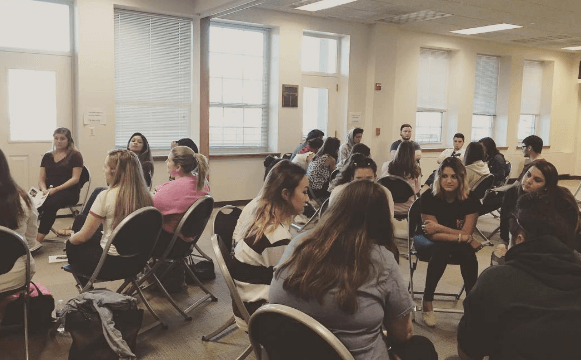Why I Brought One Love’s Escalation
To My Campus

All through the month of October, One Love is holding an Escalation Workshop Challenge open to all schools and facilitators. For information about the challenge and how you can bring Escalation Workshop to your campus, check out: www.joinonelove.org/escalation_challenge
Josephine first heard about One Love when she was elected as the Vice President of her sorority. In this role, it was her responsibility to brainstorm events for her sisters. At first, Josephine didn’t think relationship abuse was a big deal or know how many people it affected. She had heard of the Escalation film before, but she had no idea that it was part of a much bigger undertaking – a movement to end relationship abuse. That was when she knew that she had to get in touch with someone at One Love and bring the movement to her campus.
Her first step was reaching out to One Love through the website
Josephine reached out to One Love through the website and was connected with a program coordinator on staff. She set up a time with the coordinator to talk about One Love and get trained as a facilitator of the workshop. “At first I thought it would just be a movie,” she recalled. She didn’t realize that there was so much she could be doing on her campus to educate her peers about relationship abuse. In speaking with the staff coordinator, she discovered that while the film Escalation was touching, the most powerful part of the workshop was the group discussion that followed. After watching the film, students form groups to talk through the film, learn how to help those in unhealthy relationships, and recognize the warning signs of abuse. Although it was a bit scary to hear how much authority she had when it came to bringing One Love to her campus, she was determined to move forward. “It was totally overwhelming, but I knew I could change lives so I did it.” Josephine understood that more people needed to learn about this issue and how prevalent the problem of relationship abuse is, and so she decided to hold Escalation Workshop on her campus.
Next, she attended an online training to be a workshop facilitator
Before getting trained, Josephine enlisted the help of some of her peers in Greek-life, scheduled time for the upcoming workshop, reserved space on campus, and spread the word about the event to all of the sororities and fraternities. During the virtual facilitator training, a staff coordinator walked through a manual for the workshop which included group questions, learning points from the film, and lots of other resources. The facilitator training was quick and straight-forward. Next came the hard part – actually getting people to attend the workshop.
Running the workshop was the final step and by far the most rewarding part of her experience
Josephine opened the workshop to all students at her school, not just her fellow Greeks. She knew this was an issue that impacted all kinds of people, so she didn’t want to close the workshop off to other groups and students. “It was a process getting people to come” Josephine said, and she was admittedly very nervous about facilitating in front of a group of peers. But the familiar faces in the crowd, like Josephine’s boyfriend and some of her close friends, made leading the discussion more comfortable. Once the film was screened, the crowd was quiet. “The movie was serious, so it got serious.” As they moved into their groups for the discussion that followed, the students began talking about the film and what they had just seen. To her surprise, people were eager to talk about this tough topic. They slowly opened up about their own experiences with relationship abuse, and to everyone’s amazement, the students found the film relatable and admittedly had seen many of the unhealthy behaviors before.
Looking back and planning for next year
After the workshop, Josephine’s perspective was changed. “People shared stories when I didn’t ask,” she admitted, “it was so nice to see it.” Happy with how the workshop went and how her peers chose to open up about their own experiences with dating abuse, Josephine felt proud for bringing the workshop to her campus. “People were comfortable talking to me about this issue.” She was starting a dialogue about an issue that most are afraid to speak up about, and in the process she was helping others. “This was a very personal workshop” Josephine said after the group discussions had ended “it was a commitment, but it was so worth it.”
Josephine is now planning another workshop on her campus for next year. Learning from some of the challenges she faced with this workshop, she plans to engage other organizations on campus and reach a larger crowd. She also wants to continue to spread the word about One Love so that more people at her college know about dating violence and join the movement to end relationship abuse.




